
Planting the Seeds of a More Sustainable Furniture Industry
More Good Stories
Kashiwa Craft: Shaped by Hand, Guided by Nature
Miyuki and Hisato Iwatsuki on carrying Seto’s legacy forward with warmth.
Order by Dec 10 (US) and Dec 4 (Canada) for on-time Holiday delivery with Standard Shipping.
US & Canada: Duties and customs are on us— nothing more for you to pay.
Words by Philip Mak
Photography by Skagerak
Words by Philip Mak
Photography by Skagerak

It’s no secret that Scandinavia is a hub of good design. More than just the hygge trend, it is a transformative perspective heavily influenced and inspired by its environment, organically incorporating natural materials and the muted colors of Nordic fjords and forests. Amongst Northern Europe’s windswept waterways is the Skagerrak Strait, which has connected the cultures and commerce of Norway, Sweden and Denmark for centuries.
It is the namesake of Danish outdoor furniture and home accessories makers Skagerak, inspired by the strait’s ability to be simultaneously unchanging and constantly evolving. These qualities flow into its products: timelessly designed and built to last, made with the future and nature in mind. Founded in 1976, it is owned by Jesper and Vibeke Panduro, who took over the family-run company in 2005 and have grown the brand to encapsulate good design and design that does good.
“Sustainability is often about minimizing the negative impact, but if you turn it around it can be about maximizing the positive impact, which is what Skagerak tries to do,” explains Jesper.
He continues, “If you just use sustainability as a tool to sell more or to increase your profit, you’re doing it for the wrong reasons. You need to do it because you want to take care of something.”
Outdoor furniture uses a lot of wood. While Skagerak has consistently embraced sustainability by choosing the highest-quality materials and behaving in a responsible way, its code of conduct has not always had the right words to express it. Jesper reshaped the company around his vision and values based in responsibility — becoming a B Corp, using more Forest Stewardship Council-certified wood (FSC) and aligning with the UN Global Compact.
“Sustainability is just a word. For me, it’s more about the behaviour you put into it; you have to take a 360-degree approach to how your organization acts. No-one can do everything but we can all do something.”
By working with outside organizations, Jesper ensures that his company has both third-party oversight and has also crafted an 11-step code of conduct for its employees, designers and suppliers. This is not only for them to follow, but to ensure they share the same values too. To him, it all comes down to being responsible, respectful and building lasting relationships — with both the people and planet.
Skagerak’s designs come from emerging and established third-party artists, who continue to receive royalties for their work as products are sold. This is in keeping with the company’s commitments to fair pay and relationship-building. It also extends to the manufacturing process, with Skagerak ensuring workers are respected and properly compensated — whether they are in Denmark or Vietnam.
Having values without borders is important for Skagerak as most of its outdoor furniture is made of teak sourced from Southeast Asia. The company is working towards 100 percent FSC-certified wood by 2025; collaborating with the organization ensures no more trees are felled than the forest can reproduce and also that local communities, biodiversity and workers are treated fairly.
The trees that are felled, and the subsequently replanted forests, are natural containers for carbon dioxide — keeping it out of the atmosphere and helping to combat climate change. In turn, as Skagerak furniture, the wood continues to hold the greenhouse gas until it is either scrapped or burnt.
To ensure furniture lives as long as possible and to encourage customers to care for it, clients can bring items back to Skagerak for credit when they no longer have a use for them. They are then resold as part of the Reclassic circular economic system — complete with a story of its former home and often a natural patina finish.
“If we can minimize production, cutting trees and using energy, it’s great. We believe in both producing new items and ensuring our older products can find new homes,” says Jesper.
He continues, “Usually we don’t have to rebuild it or take it apart or anything, just pass it along to the next owner with just a wash. Great taste doesn’t age.”
“Why I get up in the morning. It’s why I go to work, innovate or change. If it was just money as motivation, why would you keep doing anything? How much can you buy? If you have a purpose, it’s just there.”
As Skagerak looks towards the next forty years, it wants to continue growing organically — much like the trees it helps replant around the world. In joining a global platform like GOODEE, it has found a new community and likeminded collaborators.
Inspired by GOODEE’s mission Jesper says ‘purpose’ to him is, “Why I get up in the morning. It’s why I go to work, innovate or change. If it was just money as motivation, why would you keep doing anything? How much can you buy? If you have a purpose, it’s just there.”
Now that’s an idea that can certainly take root.

Philip Mak is a London-based freelance copywriter and journalist. His work usually covers sustainability, culture, and fashion and beauty though he will try anything once. When not writing, Philip is probably shopping, travelling or doing nothing to save for the first two.
Miyuki and Hisato Iwatsuki on carrying Seto’s legacy forward with warmth.
All our orders are shipped with carbon off-set shipping.
Get access to exclusive discounts and products for all your projects.
Find the perfect gift for your loved one with our curated options.
Create your perfect registry and get gifts you will love.



